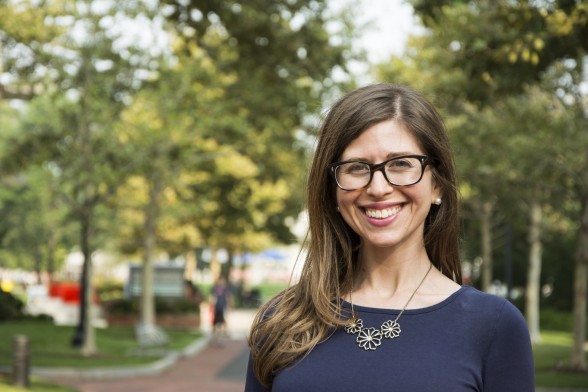
Assistant Professor Meryl Alper
The initial release of the Apple iPad in the spring of 2010 got Communications Studies Assistant Professor Meryl Alper thinking about the role of everyday technology in the lives of young people with disabilities. A Ph.D. candidate at the University of Southern California at the time, Alper began to draw connections between augmentative and alternative communication (AAC) devices used by people with significant speech impairments (such as physicist Stephen Hawking) and mobile communication technologies such as the iPad. Ultimately, the topic became the subject of her dissertation.
Since coming to Northeastern University in the fall of 2015, Alper’s work has continued to evolve. This January, she published a book with MIT Press, entitled Giving Voice: Mobile Communication, Disability, and Inequality. In Giving Voice, which is also the first book-length study of iPad use and adoption, Alper examines the common idea that mobile and AAC technologies act to “give voice to the voiceless.” Such a claim has been made for decades now, which Alper discovered while researching early AAC devices from the 1970s and 1980s.

Giving Voice, Available now through MIT Press
“I started to notice that the iPad, as an AAC device, was being talked about in very similar ways to how some of these much simpler machines had,” Alper said. “This wasn’t just a claim about vocalization, but about agency and power.”
Such concepts have proven to have major impacts on the overall success rates of modern AAC technology. While there are clear benefits to these types of devices and useful advancements are being made, there are still many barriers when considering issues such as insurance funding and school district procurement of this technology. Giving Voice dives into this topic, examining how differences among young people such as race, ethnicity, gender and socioeconomic status can impact ownership and use of AAC-capable devices.
“Sometimes solutions that ‘give voice’ also create new problems,” Alper explained in an article in Motherboard, “Technologies largely thought to universally empower the ‘voiceless’ are still subject to disempowering structural inequalities.”
Giving Voice is now available for purchase, both in stores and as an e-book here, from MIT Press. Additionally, Alper will be hosting a book release event on February 28 at 6 pm at the MIT Press Bookstore in Cambridge. She will also be signing copies of Giving Voice at the event.


